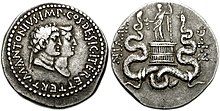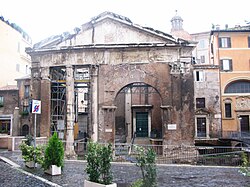Quick Facts
Biography
Octavia the Younger (69 BC – 11 BC), also known as Octavia Minor or simply Octavia, was the elder sister of the first Roman Emperor, Augustus (known also as Octavian), the half-sister of Octavia the Elder, and the fourth wife of Mark Antony. She was also the great-grandmother of the Emperor Caligula and Empress Agrippina the Younger, maternal grandmother of the Emperor Claudius, and paternal great-grandmother and maternal great-great grandmother of the Emperor Nero.
One of the most prominent women in Roman history, Octavia was respected and admired by contemporaries for her loyalty, nobility and humanity, and for maintaining traditional Roman feminine virtues.
Life
Childhood
Full sister to Augustus, Octavia was the only daughter born of Gaius Octavius' second marriage to Atia Balba Caesonia, niece of Julius Caesar. Octavia was born in Nola, Italy; her father, a Roman governor and senator, died in 59 BC from natural causes. Her mother later remarried, to the consul Lucius Marcius Philippus. Octavia spent much of her childhood travelling with her parents. Marcius was in charge of educating Octavia and her brother Augustus.
First marriage
Before 54 BC her stepfather arranged for her to marry Gaius Claudius Marcellus Minor. Marcellus was a man of consular rank, a man who was considered worthy of her and was consul in 50 BC. He was also a member of the influential Claudian family and descended from Marcus Claudius Marcellus, a famous general in the Second Punic War. In 54 BC, her great uncle Caesar is said to have been anxious for her to divorce her husband so that she could marry Pompey who had just lost his wife Julia (Julius Caesar's daughter, and thus Octavia's cousin once removed). The couple did not want to get a divorce so instead Pompey declined the proposal and married Cornelia Metella. So Octavia's husband continued to oppose Julius Caesar including in the crucial year of his consulship 50 BC. Civil war broke out when Caesar in Gaul invaded Italy in 49 BC.
Marcellus, a friend of Cicero, was an initial opponent of Julius Caesar when Caesar invaded Italy, but did not take up arms against his wife's great uncle at the Battle of Pharsalus, and was eventually pardoned by him. In 47 BC he was able to intercede with Caesar for his cousin and namesake, also a former consul, then living in exile. Presumably, Octavia continued to live with her husband from the time of their marriage (she would have been about 15 when they married) to her husband's death when she was about 29. They had three children: Claudia Marcella Major, Claudia Marcella Minor and Marcus Claudius Marcellus. All three were born in Italy. Her husband Marcellus died in May 40 BC.
Second marriage

By a Senatorial decree, Octavia married Mark Antony in October 40 BC, as his fourth wife (his third wife Fulvia having died shortly before). This marriage had to be approved by the Senate, as she was pregnant with her first husband's child, and was a politically motivated attempt to cement the uneasy alliance between her brother Octavian and Mark Antony; however, Octavia does appear to have been a loyal and faithful wife to Antony. Between 40 and 36 BC, she travelled with Antony to various provinces and lived with him in his Athenian mansion. There she raised her children by Marcellus as well as Antony's two sons; the two daughters of her marriage to Antony, Antonia Major and Antonia Minor, were born there.
Breakdown
The alliance was severely tested by Antony's abandonment of Octavia and their children in favor of his former lover Queen Cleopatra VII of Egypt (Antony and Cleopatra had met in 41 BC, an interaction that resulted in Cleopatra bearing twins, a boy and a girl). After 36 BC, Octavia returned to Rome with the daughters of her second marriage. On several occasions she acted as a political advisor and negotiator between her husband and brother. Mark Antony divorced Octavia in 32 BC, after she had supplied him with men and troops, in 35 BC, to be used in his eastern campaigns. Following Antony's rejection of her, their divorce, and his eventual suicide in 30 BC, Octavia became sole caretaker of their children as well as guardian of Antony's children from his unions with both Fulvia and Cleopatra:
- Iullus Antonius (Fulvia),
- Alexander Helios (Cleopatra),
- Cleopatra Selene II (Cleopatra),
- Ptolemy Philadelphus (Cleopatra)
Octavia did not marry a third time.
Life after Antony

Augustus adored, but never adopted, her son Marcellus. When Marcellus died of illness in 23 BC unexpectedly, Augustus was thunderstruck, Octavia disconsolate almost beyond recovery.
Aelius Donatus, in his Life of Vergil, states that Virgil
recited three whole books [of his Aeneid] for Augustus: the second, fourth, and sixth--this last out of his well-known affection for Octavia, who (being present at the recitation) is said to have fainted at the lines about her son, "… You shall be Marcellus" [Aen. 6.884]. Revived only with difficulty, she sent Vergil ten-thousand sesterces for each of the verses."
She may have never fully recovered from the death of her son and retired from public life, except on important occasions. The major source that Octavia never recovered is Seneca ("Cons ad Marcia", II.) but Seneca may wish to show off his rhetorical skill with hyperbole, rather than adhere to fact. Some facts dispute Seneca's version, for Octavia publicly opened the Library of Marcellus, dedicated in his memory, while her brother completed the Marcellus's theatre in his honor. Undoubtedly Octavia attended both ceremonies, as well as the Ara Pacis ceremony to welcome her brother's return in 13 from the provinces. She was also consulted in regard to, and in some versions advised, that Julia marry Agrippa after her mourning for Marcellus ended. Agrippa had to divorce Octavia's daughter Claudia Marcella (Major) in order to marry Julia, so Augustus wanted Octavia's endorsement very much.
Death

Octavia died of natural causes. Suetonius says she died in Augustus' 54th year, thus 10 BC with Roman inclusive counting. Her funeral was a public one, with her sons-in-law (Drusus, Ahenobarbus, Iullus Antony, and possibly Paullus Aemillius Lepidus) carrying her to the grave in the Mausoleum of Augustus. Drusus delivered one funeral oration from the rostra; Augustus the other and gave her the highest posthumous honors (e.g. building the Gate of Octavia and Porticus Octaviae in her memory). Augustus also had the Roman senate declare his sister to be a goddess. Augustus declined some other honors decreed to her by the senate, for reasons unknown. She was one of the first Roman women to have coins minted bearing her image; only Antony's previous wife Fulvia pre-empted her.
Issue
- Children with Marcellus
Octavia and her first husband had one son and two daughters born late in their marriage:
- Marcellus
- Claudia Marcella Major
- Claudia Marcella Minor
- Children with Mark Antony
Octavia and Mark Antony had two daughters by their marriage (her second, his fourth), and both were the ancestors of later Roman emperors.
- Antonia Major: also known as Julia Antonia Major, grandmother to Emperor Nero.
- Antonia Minor: also known as Julia Antonia Minor, mother to Emperor Claudius, grandmother to Emperor Caligula, and great-grandmother to Emperor Nero.
Ancestry
| Ancestors of Octavia the Younger | ||||||||||||||||||||||||||||||||||||||||||||||||||||||||||||||||||||||||||||||||||||||||||||||||||||||||||||||||||||||||||||||||||||||||||||||||||||||||||||||||||||||||||||||||||||||||||||||||||||||||||||||||||||||||||||||||||||||||||||||||||||||||||||||||||||||||||||||||||||||||||||||||||||||||||||||||||||||||||||||||||||||||||||||||||||||||||||||||||||||||||||||||||||||||||||||||||||||||||||||||||||||||||||
|---|---|---|---|---|---|---|---|---|---|---|---|---|---|---|---|---|---|---|---|---|---|---|---|---|---|---|---|---|---|---|---|---|---|---|---|---|---|---|---|---|---|---|---|---|---|---|---|---|---|---|---|---|---|---|---|---|---|---|---|---|---|---|---|---|---|---|---|---|---|---|---|---|---|---|---|---|---|---|---|---|---|---|---|---|---|---|---|---|---|---|---|---|---|---|---|---|---|---|---|---|---|---|---|---|---|---|---|---|---|---|---|---|---|---|---|---|---|---|---|---|---|---|---|---|---|---|---|---|---|---|---|---|---|---|---|---|---|---|---|---|---|---|---|---|---|---|---|---|---|---|---|---|---|---|---|---|---|---|---|---|---|---|---|---|---|---|---|---|---|---|---|---|---|---|---|---|---|---|---|---|---|---|---|---|---|---|---|---|---|---|---|---|---|---|---|---|---|---|---|---|---|---|---|---|---|---|---|---|---|---|---|---|---|---|---|---|---|---|---|---|---|---|---|---|---|---|---|---|---|---|---|---|---|---|---|---|---|---|---|---|---|---|---|---|---|---|---|---|---|---|---|---|---|---|---|---|---|---|---|---|---|---|---|---|---|---|---|---|---|---|---|---|---|---|---|---|---|---|---|---|---|---|---|---|---|---|---|---|---|---|---|---|---|---|---|---|---|---|---|---|---|---|---|---|---|---|---|---|---|---|---|---|---|---|---|---|---|---|---|---|---|---|---|---|---|---|---|---|---|---|---|---|---|---|---|---|---|---|---|---|---|---|---|---|---|---|---|---|---|---|---|---|---|---|---|---|---|---|---|---|---|---|---|---|---|---|---|---|---|---|---|---|---|---|---|---|---|---|---|---|---|---|---|---|---|---|---|---|---|---|---|---|---|---|---|---|---|---|---|---|---|---|---|---|---|---|---|---|---|---|---|---|
| ||||||||||||||||||||||||||||||||||||||||||||||||||||||||||||||||||||||||||||||||||||||||||||||||||||||||||||||||||||||||||||||||||||||||||||||||||||||||||||||||||||||||||||||||||||||||||||||||||||||||||||||||||||||||||||||||||||||||||||||||||||||||||||||||||||||||||||||||||||||||||||||||||||||||||||||||||||||||||||||||||||||||||||||||||||||||||||||||||||||||||||||||||||||||||||||||||||||||||||||||||||||||||||
Descendants
Three Roman emperors, Caligula, Claudius and Nero, were amongst the most famous of her descendants.
- Octavia the Younger
- Marcus Claudius Marcellus (42 BC – 23 BC), no issue
- Claudia Marcella Major (born 41 BC)
- Vipsania Marcella Agrippina (Marcellina) (born 27 BC)
- Lucius Antonius (20 BC – AD 25), no issue
- Gaius Antonius (? – ?), issue unknown
- Iulla Antonia (after 19 BC – ?), issue unknown
- Appuleia Varilla (? – ?), issue unknown
- Claudia Marcella Minor (born 40 BC)
- Paullus Aemilius Regulus (? – ?), issue unknown
- Claudia Pulchra (14 BC–26)
- Marcus Valerius Messalla Barbatus (11 BC – 20/21)
- Marcus Valerius Messalla Corvinus (? – ?), possibly son of Aurelius Messalinus
- Valeria Messalina (17 AD or 20 AD – 48 AD)
- Claudia Octavia (39 AD or 40 AD – 62 AD), no issue
- Tiberius Claudius Caesar Britannicus (41 AD – 55 AD), no issue
- Valeria Messalla (c. 10 BC – ?)
- Lucius Vipstanus Poplicola (c. 10 – after 59)
- Gaius Valerius Poplicola (? – ?), issue unknown
- Gaius Vipstanus Messalla Gallus (c. 10 BC – after 60)
- Lucius Vipstanus Messalla (c. 45 – c. 80)
- Lucius Vipstanus Messalla (c. 75 – after 115), according to some authors, this man may be one of Saint Melania's ancestors.
- Lucius Vipstanus Messalla (c. 45 – c. 80)
- Lucius Vipstanus Poplicola (c. 10 – after 59)
- Julia Antonia Major (39 BC – before 25 AD)
- Domitia Lepida the Elder (c. 19 BC – 59 AD)
- Quintus Haterius Antoninus (? – ?)
- Gnaeus Domitius Ahenobarbus (17 BC – 40 AD)
 Nero Claudius Caesar Augustus Germanicus (Lucius Domitius Ahenobarbus) (37 AD – 68 AD)
Nero Claudius Caesar Augustus Germanicus (Lucius Domitius Ahenobarbus) (37 AD – 68 AD)- Claudia Augusta (January 63 AD – April 63 AD), died young
- Domitia Lepida the Younger (10 BC – 54 AD)
- Domitia Lepida the Elder (c. 19 BC – 59 AD)
- Julia Antonia Minor (36 BC – 37 AD)
- Germanicus Julius Caesar (16 BC or 15 BC – 19 AD)
- Nero Julius Caesar Germanicus (6 AD – 30 AD), no issue
- Drusus Julius Caesar Germanicus (7 AD – 33 AD), no issue
- Tiberius Julius Caesar Germanicus (born between 7 and 12 AD), died as an infant
- Ignotus (born between 7 and 12 AD), died as an infant
- Gaius Julius Caesar Germanicus Major (born between 7 and 12 AD), died in childhood
 Gaius Julius Caesar Augustus Germanicus (Caligula) (12 AD – 41 AD)
Gaius Julius Caesar Augustus Germanicus (Caligula) (12 AD – 41 AD)- Julia Drusilla (39 AD – 41 AD), died young
- Julia Agrippina (Agrippina Minor) (15 AD – 59)
- Julia Drusilla (16 AD – 38 AD), no issue
- Julia Livilla (18 AD – 42 AD), no issue
- Claudia Livia Julia (Livilla) (13 BC – 31 AD)
- Julia Livia (5 AD – 43 AD)
- Gaius Rubellius Plautus (33 AD – 62 AD), had several children
- Rubellia Bassa (born between 33 AD and 38 AD)
- Octavius Laenas (? – ?)
- Sergius Octavius Laenas Pontianus (? – ?)
- Octavius Laenas (? – ?)
- Gaius Rubellius Blandus (? – ?), issue unknown
- Rubellius Drusus (? – ?), issue unknown
- Tiberius Julius Caesar Nero Gemellus (19AD – 37 AD or 38 AD), no issue
- Tiberius Claudius Caesar Germanicus II Gemellus (19 AD – 23 AD), died young
- Julia Livia (5 AD – 43 AD)
 Tiberius Claudius Caesar Augustus Germanicus (10 BC – 54 AD)
Tiberius Claudius Caesar Augustus Germanicus (10 BC – 54 AD)
- Germanicus Julius Caesar (16 BC or 15 BC – 19 AD)
Fictional representations

A highly fictionalized version of Octavia's early life is depicted in the 2005 television series Rome, in which Octavia of the Julii (Kerry Condon) commits incest with her brother Gaius Octavian, has a lesbian affair with Servilia of the Junii (the series' version of Servilia) and a romantic relationship with Marcus Agrippa (based on the historical Marcus Vipsanius Agrippa).
Octavia's later life, around the time of the death of Marcellus, is depicted in the 1976 television adaptation of Robert Graves's novel I, Claudius. The role was played by Angela Morant, and should not be confused with her great-granddaughter Claudia Octavia (also referred to as "Octavia" in the series), Claudius' daughter and wife of the future emperor Nero, who was played by Cheryl Johnson.
